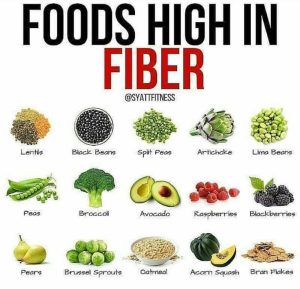A high-fiber diet offers numerous health advantages, encompassing improved digestive health, weight management, and a reduced risk of chronic diseases. In this article, we will explore the substantial benefits associated with a high-fiber diet and how it can contribute to your overall well-being.
1. Enhanced Digestive Health:
One of the most well-known benefits of a high-fiber diet is the promotion of digestive health. Dietary fiber plays a pivotal role in this regard:
- Preventing Constipation: Fiber adds bulk to the stool, softening it and making it easier to pass. This helps prevent or alleviate constipation.
- Regulating Bowel Movements: High-fiber foods promote regular bowel movements, reducing the risk of digestive discomfort.
- Preventing Diverticular Disease: Adequate fiber intake can lower the risk of diverticular disease by promoting the health of the colon.
https://wp-public-fs.s3.ap-south-1.amazonaws.com/tasks/15f60fcccb81c027eb79a7aff2168d0a05e2ab1b122fc3/images/fiber_1-5f63e22be5180.jpg
2. Weight Management:
High-fiber foods are remarkably filling and can contribute to effective weight management:
- Appetite Control: Fiber-rich foods create a sense of fullness, which reduces overall caloric intake and helps control appetite.
- Calorie Reduction: Choosing high-fiber options can naturally lead to a lower calorie intake while still providing essential nutrients.
3. Blood Sugar Regulation:
For individuals with diabetes or those at risk, a high-fiber diet can be a valuable tool in regulating blood sugar:
- Slowing Sugar Absorption: Soluble fiber, found in foods like oats and legumes, can slow down the absorption of sugar, stabilizing blood sugar levels.
- Reducing Glycemic Index: Many high-fiber foods have a lower glycemic index, which can help prevent blood sugar spikes.
4. Heart Health:
A high-fiber diet is linked to numerous heart-healthy benefits:
- Lowering Cholesterol: Soluble fiber, like that found in oats and legumes, can help lower LDL (bad) cholesterol levels, reducing the risk of heart disease.
- Reducing Blood Pressure: High-fiber diets have been associated with lower blood pressure, promoting cardiovascular health.
5. Prevention of Chronic Diseases:
A high-fiber diet is a cornerstone in the prevention of several chronic diseases:
- Type 2 Diabetes: Adequate fiber intake can reduce the risk of developing type 2 diabetes.
- Colorectal Cancer: Consuming fiber-rich foods is associated with a lower risk of colorectal cancer.
- Cardiovascular Disease: By reducing cholesterol levels and blood pressure, a high-fiber diet can lower the risk of heart disease.
6. Gastrointestinal Conditions:
Fiber can be particularly beneficial for individuals with certain gastrointestinal conditions:
- Irritable Bowel Syndrome (IBS): Fiber supplements, particularly psyllium, can help manage IBS symptoms.
- Diverticulitis: A high-fiber diet can prevent diverticulitis by promoting colon health.
7. Longevity:
Some research suggests that a high-fiber diet is linked to a longer lifespan. Consuming fiber-rich foods supports overall well-being and vitality.

Conclusion: Prioritizing Fiber for a Healthier Life
A high-fiber diet offers a multitude of health benefits, including improved digestive health, weight management, and a reduced risk of chronic diseases. By prioritizing fiber-rich foods in your daily meals, you can nurture your health and enhance your well-being, promoting a happier and healthier life.





